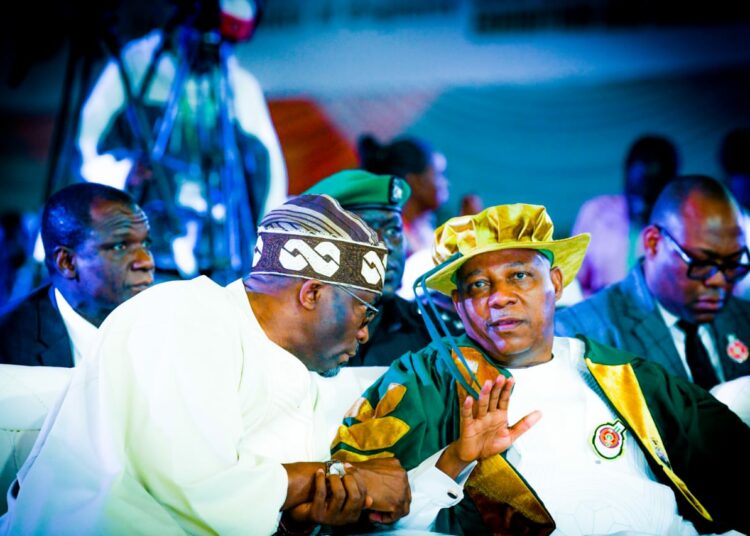Speaker of the House of Representatives, Rt. Hon. Abbas Tajudeen, on Tuesday, said that the intersection of engineering and governance was significant in the pursuit of sustainable growth and development.
Tajudeen stated this in Abuja while delivering his remarks at the ‘2023 NSE National Engineering Conference, Exhibition and Annual General Meeting’, themed: ‘Re-Engineering the manufacturing sector for competitiveness and enhanced economic growth’.
Represented by the Deputy Speaker, Rt. Hon. Benjamin Okezie Kalu, the Speaker said the theme of the event aligned with national goals, which emphasise the vital role of engineering in shaping the future.
He made reference to the Federal Government’s National Integrated Infrastructure Master Plan (NIIMP), launched in 2020, which envisions an investment of $2.3 trillion over the next 23 years to bridge Nigeria’s infrastructure deficit.
The undertaking, Tajudeen said, underscores the critical role of engineering in addressing the nation’s infrastructure needs and laying the foundation for economic prosperity.
The Speaker also said that the legislature, plays a pivotal role in enacting effective and timely legislation that facilitates infrastructure development.
He noted that by creating a pro-business regulatory environment, the legislature can encourage private sector participation and unleash the transformative potential of engineering.
Urging relevant stakeholders to harness the power of engineering and governance to re-engineer the manufacturing sector and propel the nation forward, Tajudeen assured that 10th House of Representatives is open to constructive dialogue with the NSE.
The Speaker said, “I am delighted and honoured to open the 2023 Nigerian Society of Engineers (NSE) National Engineering Conference, Exhibition, and Annual General Meeting. As we gather under this insightful theme, I am reminded of the words of Sir John Beddington, a one-time Chief Scientific Adviser to the UK Government, who once remarked, “Engineering is the art of making things that work.” This simple yet powerful statement highlights the essence of engineering, which is the ability to harness knowledge, creativity, and innovation to transform ideas into tangible realities that improve our lives and propel our society forward.
“The intersection of engineering and governance is particularly significant in our pursuit of sustainable growth and development. Infrastructure development is not merely about constructing roads, bridges, and power plants; it is about creating a holistic ecosystem that fosters economic productivity, enhances social well-being, and promotes environmental sustainability. Achieving this synergy requires a governance framework that is conducive to innovation, collaboration, and accountability. The legislature’s oversight function ensures that infrastructure projects are executed with transparency, efficiency, and adherence to the highest standards. By holding the executive branch accountable, the legislature safeguards the integrity of public funds and ensures that infrastructure projects deliver the intended benefits to the Nigerian people.
“The convergence of engineering and governance is not a new concept. In the aftermath of America’s Gilded Age, the Progressive Era ushered in a period of transformative reforms, characterized by a close partnership between engineers and policymakers. This collaboration led to the development of crucial infrastructure, such as the National Highway System, which played a pivotal role in America’s economic resurgence. Similarly, China’s rapid economic growth following its own Gilded Age can be attributed, in part, to the strategic integration of engineering and governance. The Chinese government’s emphasis on infrastructure development, coupled with its willingness to embrace new technologies, has fueled the nation’s industrialization and transformed it into a global economic powerhouse.
“In essence, “Engineering and Governance” in the Nigerian context emphasizes the indispensable link between a well-informed government, equipped with engineering knowledge, and effective decision-making. It is, therefore, the reason why I opine that collaboration with technical institutions like the Nigerian Society of Engineers (NSE), through initiatives like short-term expert consulting, is crucial in navigating the intricate technical landscape of policymaking, ensuring the success of policies, and averting costly errors.
“In conclusion, I would like to express my sincere appreciation to the Nigerian Society of Engineers for organizing this important conference and providing a platform for engineers, policymakers, and stakeholders to engage in meaningful dialogue and collaboration. To the members of NSE, I urge you to continue to excel in your endeavors and contribute your expertise to the development of our nation. The 10th House of Representatives is indeed the People’s House, and therefore open to constructive dialogue with the NSE. Your commitment to engineering excellence is essential for building a prosperous and sustainable future for Nigeria.”





